Hyaluronic acid (HA) is a popular ingredient in skincare products due to its ability to hydrate and moisturize the skin effectively. It is a naturally occurring substance found in the body, particularly in the skin, connective tissues, and eyes.
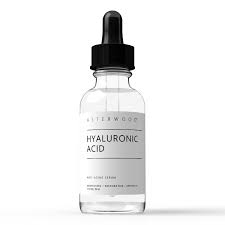
Various forms of Hyaluronic acid used for skin:
It’s important to choose products with hyaluronic acid based on your specific skin type, concerns, and skincare routine. Hyaluronic Acid serums are lightweight, fast-absorbing liquids that contain a high concentration of hyaluronic acid. These serums are designed to be applied directly to the skin before moisturizers and can provide intense hydration and a plumping effect. Many moisturizers and facial creams include hyaluronic acid as an ingredient. These products are suitable for daily use and help maintain skin hydration throughout the day. They are often used as the final step in a skincare routine to lock in moisture. Sheet masks soaked in a hyaluronic acid solution are popular for providing a quick burst of hydration. These masks are typically left on the skin for 10-20 minutes and are a great addition to a skincare routine, especially before special occasions or when your skin needs extra moisture.
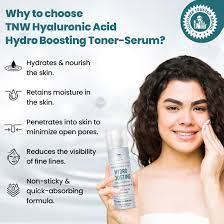
Eye creams containing hyaluronic acid are formulated to target the delicate skin around the eyes. They help reduce the appearance of fine lines, puffiness, and dark circles while providing hydration to this sensitive area. In a clinical setting, hyaluronic acid fillers are used in cosmetic procedures to add volume, reduce wrinkles, and enhance facial features. Common brand names for these fillers include Juvéderm and Restylane. These procedures are typically performed by dermatologists or plastic surgeons. HA-infused lip products can help keep the lips hydrated and plump. They are designed to provide moisture and reduce the appearance of lip lines. Some sunscreens now include hyaluronic acid as an ingredient to offer both sun protection and hydration. These products can help prevent moisture loss from sun exposure. Some facial cleansers contain HA to help maintain skin hydration while cleansing. These products can be beneficial for individuals with dry or sensitive skin. HA can also be incorporated into chemical peels for exfoliation and skin rejuvenation. These peels are usually performed by skincare professionals. Some people purchase pure hyaluronic acid powder to mix into DIY skincare products or masks. While this allows for customization, it should be done with caution to ensure proper formulation and hygiene.
Dosage level:
Hyaluronic acid is typically used in skincare products in various concentrations depending on the product’s intended purpose and formulation. There isn’t a specific “dosage” of hyaluronic acid for the skin like you might have for medications, but the concentration of Hyaluronic acid in skincare products can vary widely.
Low Concentrations (0.05% to 0.1%): These are often found in daily moisturizers and some cleansers. They provide a light, everyday boost of hydration and are suitable for most skin types.
Moderate Concentrations (0.5% to 2%): Products like serums and toners typically contain moderate concentrations of HA. They offer more targeted hydration and are often used to address specific skin concerns such as dryness or the early signs of aging.

High Concentrations (2% and above): High concentrations of Hyaluronic acid are typically found in specialized serums or treatments designed for intense hydration and anti-aging. These products can provide a significant moisture boost but may not be necessary for everyone.
Benefits of Hyaluronic Acid:
Hyaluronic acid offers several benefits to the skin:
Hyaluronic acid (HA) is a powerful humectant, meaning it attracts and retains moisture. It has the ability to hold up to 1,000 times its weight in water, which makes it an excellent hydrating agent. When applied topically, it helps to increase the skin’s moisture levels, keeping it well-hydrated and plump. Hydrated skin tends to look smoother and more supple. HA can help reduce the appearance of fine lines and wrinkles by filling in the skin with moisture, giving it a smoother and more youthful appearance. Adequate hydration is essential for maintaining skin elasticity. Hyaluronic acid helps to preserve the skin’s firmness and elasticity, which can contribute to a more youthful and toned complexion.
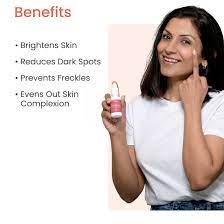
Hyaluronic acid plays a role in maintaining the skin’s barrier function. A strong skin barrier is essential for protecting the skin from environmental stressors, pollutants, and irritants. By reinforcing the skin barrier, Hyaluronic acid can help improve its overall health and r esilience. HA has anti-inflammatory properties, which can help soothe and calm irritated or sensitive skin. It can be beneficial for those with conditions like eczema or rosacea. Hyaluronic acid is generally non-comedogenic, which means it is unlikely to clog pores or cause acne breakouts. This makes it suitable for a wide range of skin types, including acne-prone skin. HA can be used in various skincare products, including serums, creams, moisturizers, and sheet masks. It can be easily incorporated into your existing skincare routine.
Read Also: Retinol: Your Key to Youthful Skin
Hyaluronic acid can be combined with other beneficial skincare ingredients, such as vitamins, antioxidants, peptides, and retinol, to address multiple skincare concerns simultaneously. HA is typically well- absorbed by the skin, providing immediate hydration without leaving a heavy or greasy feeling. Hyaluronic acid is a naturally occurring substance in the body, so it is well-tolerated by most individuals and is less likely to cause allergic reactions. HA has been used in medical settings to promote wound healing and tissue repair. While skincare products may not have the same potency as medical-grade Hyaluronic acid, they can still contribute to skin recovery and repair. Regular use of HA can help maintain a more youthful and radiant complexion by addressing issues related to dryness, dullness, and the signs of aging.
Precautions:
Hyaluronic acid is generally safe and well-tolerated by most people, there are a few precautions to keep in mind when using Hyaluronic acid on your skin to ensure the best results and minimize the risk of any potential adverse reactions. Before using any new skincare product containing hyaluronic acid, perform a patch test. Apply a small amount of the product to a discreet area of your skin, such as the inside of your wrist or behind your ear. Wait 24 to 48 hours to see if you experience any irritation, redness, itching, or allergic reactions. If you do, discontinue use immediately. Choose high-quality skincare products from reputable brands. Be wary of counterfeit or low-quality products, as these may not deliver the intended benefits and could potentially cause skin issues.
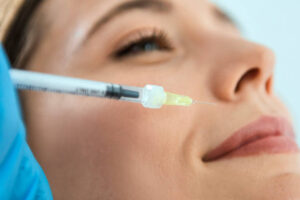
Be aware of the concentration of hyaluronic acid in the product you’re using. Different products may contain varying levels of HA, and a higher concentration does not necessarily mean better results. It’s often best to start with products that have a moderate concentration and assess how your skin responds. If you plan to use multiple skincare products, consider the order of application. Typically, HA products should be applied before heavier creams and oils. HA molecules are smaller and need to penetrate the skin first to provide hydration. Applying a moisturizer or oil after HA can help seal in the moisture. While hyaluronic acid can help hydrate the skin and improve its overall health, it does not provide sun protection. Always use sunscreen with adequate SPF when going outdoors to protect your skin from harmful UV radiation. If you have extremely dry skin, simply using HA alone may not be enough. Consider layering it with a rich moisturizer to provide added hydration and prevent moisture loss. Be cautious when combining Hyaluronic acid products with potent active ingredients like retinoids or alpha hydroxy acids (AHAs), as these can sometimes cause irritation when used together.
Read Also: Exploring the Power of Tartaric Acid
Consult with a dermatologist or skincare professional to create a safe and effective skincare routine that includes Hyaluronic acid and other active ingredients. Follow the recommended usage instructions on the product label. Overuse of HA products, especially those with high concentrations, can potentially lead to excessive moisture retention, which may not be suitable for all skin types. If you have specific skin concerns or conditions, such as severe dryness, eczema, or psoriasis, it’s advisable to consult with a dermatologist or skincare professional. They can provide personalized guidance on incorporating HA into your skincare routine and recommend suitable products. If you have a known allergy or sensitivity to any skincare ingredients, including hyaluronic acid, check the product’s ingredient list carefully to ensure it doesn’t contain any potential allergens or irritants.
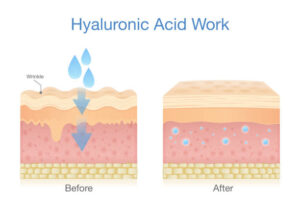
By taking these precautions and using hyaluronic acid products as directed, you can enjoy the benefits of improved skin hydration and texture while minimizing the risk of any adverse reactions.
